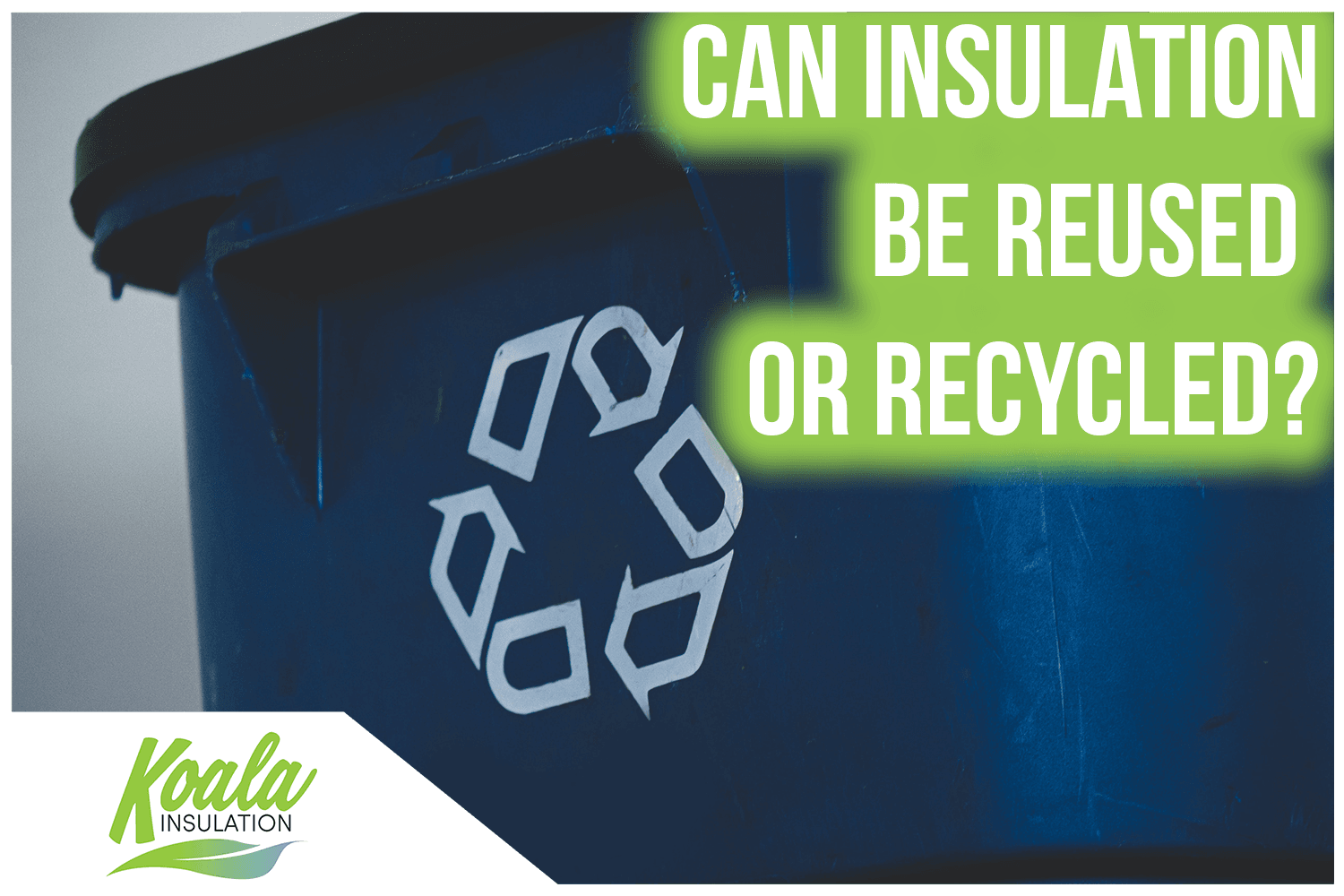
How can Insulation from Orlando be Recycled or Reused?
As a homeowner, it’s important to consider your environmental footprint when maintaining and renovating your home. Unfortunately, considering environmentally friendly products, energy cost reduction, and material waste can start to feel overwhelming for some projects. There are even areas you may not realize can affect the energy efficiency of your home. Insulation throughout the home is one such product homeowners may look over when considering their carbon footprint.
Many insulation materials are made from recycled material and contractors are taking up environmentally friendly waste practices. At Koala Insulation of Central and West Orlando, we take our insulation installation and removal practices very seriously when it comes to waste. For the benefit of educating you and your household, our team of industry experts has put together a brief breakdown of how insulation that is applied and taken from your home can be reused or recycled in Orlando, Florida.
What Recycled or Reused Insulation Saves
Recycled and reused insulation has a significant impact on your surroundings. Many types, like cellulose insulation, are produced with environmentally friendly products that not only can help prolong their lifespan but can even contribute to reduced waste when they're no longer useful to your household. With a reduced deterioration rate, less insulation needs to be applied during inspections and retrofit jobs. With less material used, less needs to be produced; this contributes both to less waste finding its way into landfills and less energy used to create new insulation.
Ensuring your insulation is recycled or reused isn’t only about the environmental impact, though. It also contributes significantly to your savings. Just as installing less updated insulation contributes to reduced waste, it also reduces the costs of your annual inspections. Skilled insulation contractors are able to carefully add in new insulation without haphazardly mixing the two together to create a giant mess of deteriorated material.
Reusing Cellulose
Cellulose insulation is already a great choice for an environmentally-conscious household. This product is made from an average of 80% recycled material, with a significant portion of it being recycled newspaper. This material is treated with fire-retardant chemicals so it's a safe product to install in your home. If the material hasn't been damaged by things like severe fire or water contact, it can also be effectively repurposed in your home. As mentioned before, though, it takes a skilled professional to effectively combine new and older insulation to retain the effective qualities.
Reusing Fiberglass
Although fiberglass insulation isn’t significantly made up of recycled materials like cellulose, it still has a degree of reusability. Similar to cellulose insulation, the material needs to be damage-free; moisture contamination can increase the risk of bacteria or mold growth if not removed properly. The insulation also can’t be significantly deflated or matted down, a problem that occurs after years of neglect and deterioration. For fiberglass batts, if undamaged, they can be removed for inspection and often replaced if they still retain adequate R-value. Their R-value is the ability to resist the transfer of heat and effectively regulate the temperature of the building.
Recycling Insulation
While it may be easy to give a vague and broad answer that “Yes, insulation can be considered a recycled material”, this could lead to a few problematic recycling bins. For example, there are
only a few counties in the United States that accept fiberglass as a recycled material. While you can check with your local recycling company for a list of materials the facility will allow, many times it’s still not permitted to just leave at the side of the curb. Other materials like cellulose can’t be recycled due to the chemicals added to make it flame retardant.
Instead, an insulation professional can give you a better breakdown of your recycling options for the insulation within your home. While many will automatically take material like mineral wool or polyurethane foam to a designated recycle site, it depends on your city and its requirements for incoming materials. If you're interested in learning more about Koala Insulation of Central and West Orlando's recycling and reusable practices based on Florida code, reach out to our team for additional information.
Schedule a Free Evaluation and Learn More
Being an environmentally friendly household doesn't have to mean increased costs and expensive materials. Instead, insulation is a product that has many recycling capabilities all the way from initial production to removal and reuse. Our team at Koala Insulation and Central and West Orlando focus on finding you the best energy-efficient material without breaking the budget.
Your household's health, safety, and comfort are top priorities for you and our team. When you schedule a free evaluation with our industry experts, we're not only looking for current and future problem areas, but we're also paying attention to health and safety hazards that could be affecting your home. It's important to us to be time and cost-sensitive so you're receiving the best possible service. Contact our team today to learn more about insulation’s impact on your home’s energy efficiency
Ready to book your free insulation evaluation?
We have 3 convienant ways for you to get in touch
We Provide Insulation Services to the Following Orlando Central Areas
ORLANDO, GOTHA, OCOEE, WINDERMERE, CLERMONT, MONTVERDE, OAKLAND, WINTER GARDEN
Counties Served
ORANGE, LAKE
Zip Code
32821, 32830, 32836, 32837, 34734, 34761, 34786, 32809, 32811, 32819, 32835, 32839, 32801, 32803, 32805, 32806, 32807, 32812, 32822, 34711, 34714, 34715, 34756, 34760, 34787
